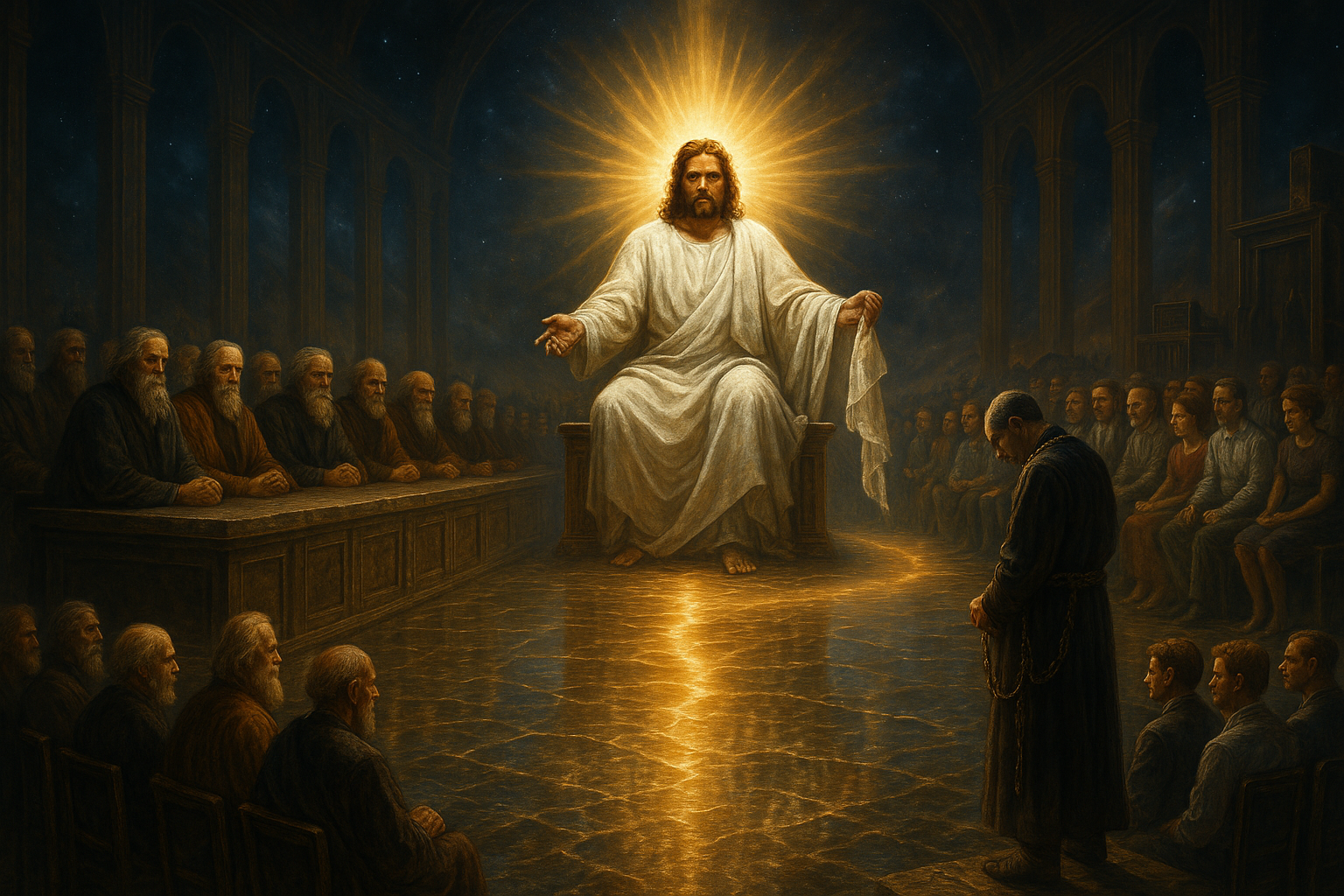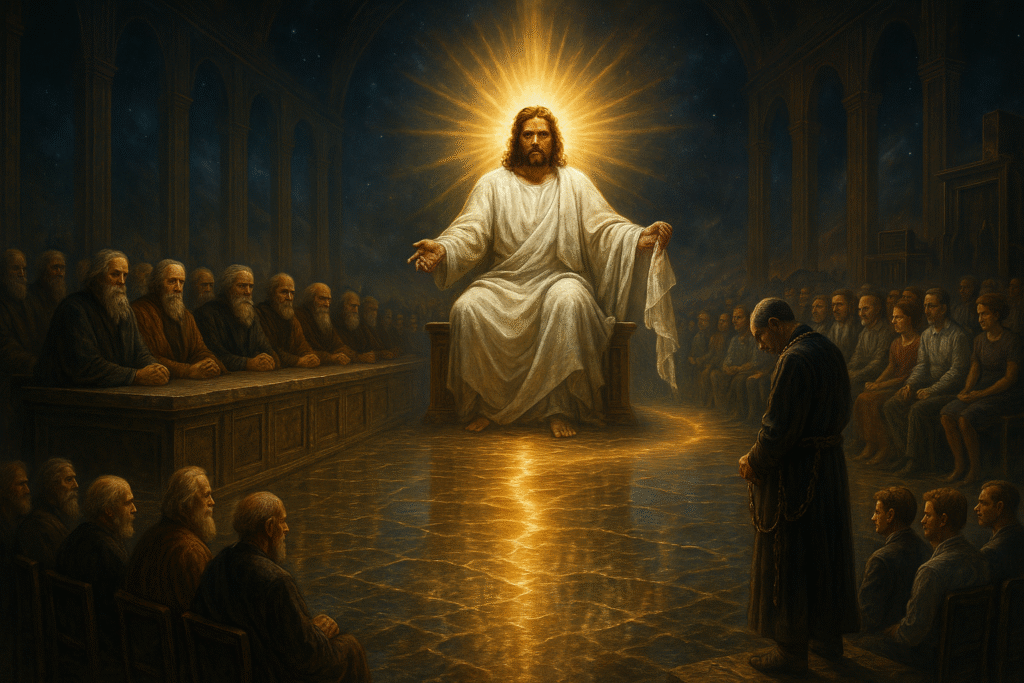Physical Address
304 North Cardinal St.
Dorchester Center, MA 02124
Physical Address
304 North Cardinal St.
Dorchester Center, MA 02124
With Michael Walker
With Michael Walker

A message to the Spoon Fed….

There comes a time when the veil of habit is torn away, and the true nature of a person’s faith is revealed—not in their profession of belief, not in their church attendance, but in the question of whether they have a God they know, or merely a god they are spoon-fed. A man who must be spoon-fed his God does not have a God at all; he has a middleman. And the middleman, whether dressed in robes, a suit, or a glowing stage light, is not a bridge to the Father—he is a substitute for the Father. I speak this not as an outsider who has never been entangled in this net, but as one who once sat in it, mistaking secondhand faith for intimacy, mistaking borrowed convictions for living truth. I once lived under this system, content to receive whatever portion was ladled to me by another, until the day Yahweh Himself confronted me with the reality that no man can know Him by proxy.
Spoon-fed religion is the art of outsourcing your pursuit. It is belief reduced to a hand-me-down, an identity built from borrowed garments. It thrives on the illusion that proximity to the things of God is the same as intimacy with God Himself. In this model, a person’s knowledge of God is a collage pieced together from sermon soundbites, cultural clichés, and the reputation of leaders—yet the God they imagine is a stranger. And the stranger they cry to in crisis is one they have never truly met. Here lies the great tragedy: they are not forsaken, they are simply unacquainted. They know the name as it is spoken to them, but not the voice as it calls them directly. And if the pulpits went silent for ninety days, their relationship would wither into nothing, because it never lived apart from the spoon.
The middleman in this setup inevitably becomes an idol. Idolatry is not only the bowing to carved stone; it is the enthroning of anything—anyone—that occupies the place in your life that belongs exclusively to Yahweh. The drift is subtle: the servant becomes the substitute, the substitute becomes the shrine, and before long, devotion, trust, and obedience are intercepted by a human conduit. The people treat this conduit as essential, even though Scripture declares without ambiguity that there is “one Mediator between God and man, the man Messiah Yehoshua” (1 Timothy 2:5). In effect, they have returned to the old priesthood that the tearing of the veil was meant to destroy. This substitution is not harmless; it is theft—stealing glory from God and robbing His people of the direct access purchased in blood.
The Word of God is explicit on this matter. When Yehoshua cried out and the veil was torn from top to bottom (Matthew 27:51), heaven declared that the way into the Holy of Holies was now open to all who would draw near with a sincere heart (Hebrews 10:19–22). The promise of the New Covenant is not that a special class will know Him, but that “they shall all know Me, from the least of them to the greatest of them” (Jeremiah 31:31–34). In the first-century ekklesia, every believer was considered a living stone, a royal priest, part of a holy nation (1 Peter 2:4–10). The gatherings were participatory, as Paul made clear: “When you come together, each one has a hymn, a teaching, a revelation…” (1 Corinthians 14:26). Shepherds were to feed the flock, not feed on them (Ezekiel 34). The whole framework of Scripture dismantles the middleman model, yet the system persists because it is profitable—for the one in the middle.
The command to “seek Me” is not poetic suggestion; it is a binding law of pursuit, and it comes with the promise of discovery (Deuteronomy 4:29; Jeremiah 29:13; Matthew 7:7–8). People understand the word seek perfectly when it comes to temporal things. Lose your car keys, and you will tear the house apart until you find them. Misplace your wallet, and you’ll retrace your steps in the rain if you must. But let the living God say “Seek Me,” and suddenly the command is treated as metaphor, as if He were inviting us to sit and contemplate the idea rather than act upon it. This is not ignorance; it is misplaced value. People will always pursue what they value most, and the level of pursuit reveals the true worth they ascribe to God. The kingdom is not stumbled into—it is taken by those who press into it with force (Matthew 11:12). Hunger and thirst for righteousness are not passing moods; they are the mark of the citizen who will be filled (Matthew 5:6). Laziness in the things of God is no less fatal than laziness in the fields; the sluggard does not plow because of the cold, and in harvest he has nothing (Proverbs 20:4).
This laziness extends beyond the private altar into the corporate body. The modern church has taught people to attend in order to receive rather than to gather in order to contribute. It is, as I have said before, like expecting a paycheck for hours someone else worked. The first-century ekklesia was a body where each part brought something for the edification of all. The modern system has reversed it—creating a stage for a few and seats for the rest, converting priesthood into spectatorship. This is spiritual welfare dependency, and it produces generations of believers who can consume endlessly but cannot build, plant, or defend. The parable of the talents (Matthew 25:14–30) stands as judgment over such passivity—what is given must be multiplied, not buried in the soil of routine.
The ekklesia by design was never meant to be an audience. It was a council of active Kingdom citizens, an assembly where the Spirit distributed gifts as He willed and every member functioned in them. The deformation came when the ekklesia was absorbed into the imperial structure, its gatherings centralized, its leaders professionalized, and its architecture redesigned into the stage-and-pew model. From there, the disease spread: programs replaced priesthood, celebrities replaced shepherds, and activity replaced intimacy. The diagnosis is clear. At the root lies idolatrous substitution. The trunk is institutional control that re-sews the veil. The branches are the programs and platforms that perpetuate the system. The leaves are the busy, visible motions without life-giving sap. And the fruit is stagnation, dependence, and estrangement from God—fruit that Yehoshua Himself will reject, saying “I never knew you” (Matthew 7:21–23).
Stagnation today is not chiefly a matter of overt sin; it is the byproduct of apathy, comfort, and domestication. We live in an age where everything is designed for outsourcing—meals, information, entertainment, even thought. We are trained to press buttons and receive outcomes. This same reflex is carried into the spiritual life, where people are content to let others pursue God on their behalf and deliver the edited highlights. The cage is padded, and safety is sold as virtue. But the ekklesia in Acts was wild, mobile, and impossible to contain. What we have now is tamed, sedentary, and marketable. The cost of comfort is authority lost, discernment dulled, and counterfeit flourishing.
Our times reveal another layer of delusion. People today mistake access to technology for intelligence. The ancients built their lives from the soil up—they cultivated crops, bred livestock, constructed shelter, forged tools, navigated seas and skies without machines, and established functioning economies by their own skill. Modern society, by contrast, has people who cannot survive a month without the grid, yet boast of their superiority because they can summon food with an app. This dependency is not progress; it is fragility. Spiritually, the same pattern holds—we can navigate church websites but not the Word, scroll endlessly through feeds but not endure in prayer, consume sermons but not carry the cross. True wisdom is living in harmony with creation and Creator, and by that measure, the ancients outshine us.
This is why so many end up blaming a stranger for their disappointments with God. They cry out, accuse, and even resent Him without ever having made the effort to know Him. In any human relationship, the first step is inquiry—Who are You? What is Your Name? Where do You dwell? How do You speak? What do You desire? Yet when it comes to the One who holds life and eternity, these questions are rarely asked, much less pursued with urgency. And when His name is substituted, when His nature is filtered through culture rather than revealed Word, the One they approach is not the One who called them. The result is a lifetime of spiritual small talk with a stranger who owes them nothing.
The way forward is not reform in word but reformation in practice. This begins with a daily rule of life anchored in seeking. Scripture must be engaged in its original context, read with the intent to obey. Prayer must be persistent, specific, and expectant. Revelation must lead to action, and action must return as testimony. Gatherings must be stripped of the stage and restored to the table, where every member contributes. Gifts must be identified, trained, and deployed. Spiritual health must be measured not by attendance but by pursuit. We must be willing to fast from the middleman—intentional seasons of no sermons, no external crutches—so that the Spirit and the Word can train us directly.
This is the identity of the Pneumocryst—the believer fully indwelt and empowered by the Breath, Word, and Being of God, functioning without the need for an external proxy. This identity speaks, heals, judges, reconciles, and builds as the living temple of God on earth. It walks in authority not borrowed from an institution but conferred by the Spirit Himself. And it refuses to be caged in a system that reassigns God’s commission to a select few while silencing the many.
Those who fear this message will protest. Some will say, “Are you rejecting teachers?” No—a true teacher equips the saints; he does not replace their pursuit. Others will argue, “Isn’t order necessary?” Yes, but order is the riverbank that guides the flow, not the dam that stops it. Some will plead, “What about the weak or new believers?” The best time to train them to seek God directly is at the beginning, before dependency takes root. And some will say, “Isn’t this divisive?” Truth always divides the counterfeit from the authentic before unity can be real.
The evidence of true reformation will be unmistakable. Private altars will burn hotter than public platforms. Discernment will sharpen, and counterfeits will lose their audience. Love will become labor and generosity a reflex. Power will return to the gatherings—prayers answered, demons cast out, lives transformed, courage restored. Mission will multiply until homes, streets, and workplaces become sanctuaries.
The call, then, is to repent—not in the shallow sense of sorrow over moral failure, but in the deep sense of renouncing the idol of the middleman, the comfort of spectatorship, and the laziness of secondhand pursuit. Confess the apathy that has dulled your hunger. Cross the torn veil daily, and draw near to Yahweh with a true heart in full assurance of faith. Take your place in the living ekklesia, bringing your portion, equipping others, and refusing to be spoon-fed again. Live as the Pneumocryst—no more strangers, no more substitutes, only Yehoshua and His body alive and functioning.
Because the day will come when the stage lights dim, the pulpit falls silent, and the only question will be whether you know Him—not know about Him, not know someone who knows Him, but whether you yourself are known by Him. And on that day, the spoon-fed will starve, but those who have sought Him with all their heart will feast forever in His presence.